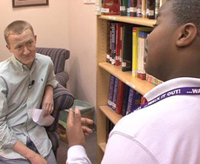
A year ago, 10 year-old Joshua had never heard of William Shakespeare. He had little interest in memorizing his lines for his after school Shakespeare program at Notre Dame’s Robinson Community Learning Center" (RCLC), and he didn’t participate in the group’s annual performance because of his lack of preparation.
Fast forward one year: In December, Joshua won first place in the third annual Shakespeare at Notre Dame regional performance competition for his dazzling presentation of his Shakespeare monologue—a scene from A Midsummer Night’s Dream.
Such is the transformative power of teaching and performing words of the Bard—a life-changing power that piqued the interest of Nicole MacLaughlin, an assistant teaching professor in the University Writing Program at Notre Dame. She recognized the potency this experience could offer her first-year writing students.
“When students have something at stake in the issue they’re writing about, when they’re writing for real audiences, when they feel like a change really can come about as a result of the thing they’re writing, students are more committed and invested in their work and end up producing something that’s more persuasive, clearer, interesting, and compelling for that audience,” MacLaughlin says.
In 2009, MacLaughlin first met Christy Burgess, the volunteer and performing arts coordinator at the RCLC, at a meeting arranged by Notre Dame’s Center for Social Concerns. The meeting brought together various community organizations with writing program faculty to talk about possible collaborations.
Burgess’ presentation and the passion with which she talked about the transformation she saw in her students struck a chord with MacLaughlin that day, and she knew then she wanted to be a part of it.
“I remember Christy saying that there were so many amazing moments she witnessed, and how the RCLC Shakespeare Program changed these kids’ lives. She wanted to record these remarkable moments for posterity,” MacLaughlin says.
The collaboration began in the fall of 2009.
“We knew we could bridge the cultural gaps in their lives through Shakespeare with intercultural learning, but also through performance anxiety,” Burgess says of the partnership.
“When we talk about experiential learning and performing the monologues together, there is a bonding that occurs.”
As members of one of Notre Dame’s 70 community-based learning courses, MacLaughlin’s first-year composition students are paired with participants in the RCLC’s Shakespeare Program, who range from 8 to 18 years old. They mentor, study, learn, and even struggle together with their “Shakespeare partners.” They use their experiences with their partners as a jumping off point for their writing assignments in MacLaughlin’s class.
“The community-based narrative argument is the main piece that is produced out of the collaboration with Shakespeare partners over the course of the semester,” MacLaughlin explains.
“I teach them different techniques for writing stories, for making a persuasive claim for an audience implicitly through the form of a story—so the story they tell in the argument is the story of their specific Shakespeare partner’s experience.”
And their personal connection to the subject matter moves her students in ways that traditional classroom experiences do not.
“The students are invested in their writing and put more time into revising this piece, making it polished so it’s something an audience is likely to read,” according to MacLaughlin.
But the personal connection to the subject matter doesn’t end with stronger writing.
“The relationships that have been built though this collaboration are ongoing,” says Burgess. “After the program is over, many students in the class want to continue working with our students—half of them actually came back to be tutors of their students.”
Learn More >
- Watch video
- Shakespeare at Notre Dame
- Nicole MacLaughlin faculty page
- Robinson Community Learning Center
- University Writing Program
- First Year of Studies
- Center for Social Concerns
Originally published at newsinfo.nd.edu.